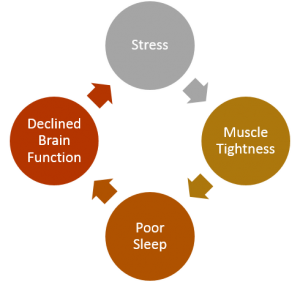Ever felt like you were stuck in a vicious stress cycle? It starts off with something that causes you some stress. And then you begin to feel your shoulders get tight, and then you find yourself not being able to sleep, and when you do get up in the morning finding that you really can’t think clearly. All of which adds to your stress levels, which then creates more tension your body, an even less ability to sleep and your ability to think has gone out the window.
Stress can occur for many different reasons and quite often the stress from home and family life can unconsciously be brought into the workplace. The reverse is also true, in that the stress from work can be brought home to the family. And stress has a way of spreading. One stressed person can easily spread the feelings of stress onto other person creating an unproductive and disharmonic environment.
What is stress?
Stress is your body’s response to certain situations and happens when you don’t get what you want or what you planned for. It’s when life seems to be going a different way to what you anticipated. And stress is subjective, meaning that what is stressful for you may not be stressful for someone else, and vice versa. There are many different kinds of stress and not all of them are bad. Some stress can actually help propel you forward and get things done.
But the bad kind, the stress that is continual, affects your physical and mental health, and your behaviour.
The effects of stress
- Stress increases your heart rate, your brain works faster, and you have a sudden burst of energy. This is a natural and basic response but too much, prolonged stress can have harmful effects. High consistent levels affects the brain by increasing activity in the amygdala or fear centre.
- Continual stress can affect the size of your brain and in fact make it shrink and loose synaptic connections between the neurons. This then affects the prefrontal cortex that regulates behaviours like concentration, decision making, judgement and social interactions.
- Stress makes learning harder as we take in and process less information.
- Stress affects our memory.
- Stress also affects digestion, muscle tension, our ability to sleep soundly and the list goes on.
It’s may seem impossible to completely eliminate bad stress from your life, but you can learn to avoid some stressors and manage the rest by determining what effect the stress is having on your thinking abilities and then balancing the brain back into integration.
What does Brain Integration mean?
An integrated brain is one where communication is flowing and it is functioning at an optimal level. There is increased productivity, increased creativity and the ability to think more clearly.
An unintegrated brain is one where the communication between the different components is compromised. Stress is one of the biggest factors of an unintegrated brain and affects not only the communication between the different functions of the brain but also how we take in auditory and visual information. It is common that when you are under stress you will default to a certain “unintegrated stress” program and this “program” can change with different stressors.
There is a fantastic book called The Dominance Factor by Carla Hannaford, Ph.D. that goes into detail explaining the different dominances within our brain, our auditory processing and our visual processing.
Kinesiology is a great way to help determine what you default “unintegrated stress” program is and how you can balance it to bring back an integrated brain. The exercises or movements are easy to do and can virtually be done anywhere meaning they are great for both school children as well as adults.
I currently run workshops and presentations on this topic and can run the participants through a series of tasks to determine what their dominance is and then empower them with the tools to create an “Integrated Brain”. If you want more information, please don’t hesitation to contact me.
And remember, Happiness Starts with a Smile, but Empowered Starts with a Choice.


